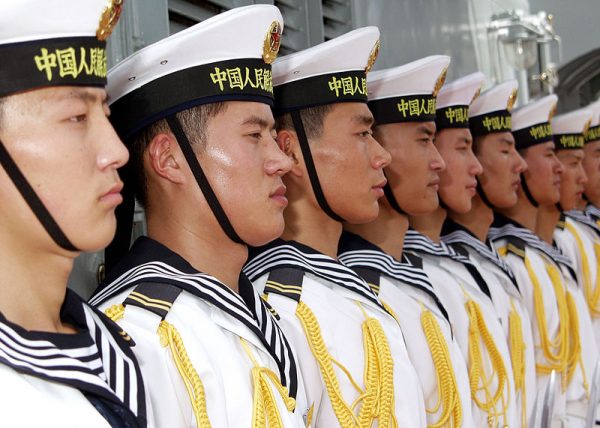to this problem is contained in his 2012 book The China Choice.
White first calls on the USA to partially withdraw from its strategic position in Asia, thereby freeing up more space for Chinese influence. Secondly, White recommends that a four-power ‘Concert of Asia’ manage regional security affairs. Unfortunately, both of these ideas have deep flaws.
In White’s view, current US policy is maintaining primacy (dominance over the international system) by forcing China to ‘abandon its aspirations for a larger regional role’ (that is, ‘containment’). America won’t let China become a great power, but China will go to war if necessary to achieve this goal. White’s solution is a different kind of ‘re-balancing’ in which China would rise and the USA would fall into the same status as ordinary great powers, neither having primacy. This would avert war because China does not insist on primacy, only great power status.
White’s characterisation of US strategic policy in Asia as simply a drive to maintain American primacy, something in which US friends and allies have no inherent interest, is an oversimplification. US policy upholds a relatively open, liberal regional order that most countries in the region find unambiguously beneficial. It is clear that the Chinese, given the chance, would change some aspects of that order to suit narrow Chinese preferences.
The need for White’s Concert is questionable if the USA and China can work out their differences bilaterally without the complication of two other powers added to the mix.
In fact, Washington has shown considerable willingness to accommodate China’s rise.
The United States is not ‘containing’ China any less than China, which often uses its diplomatic and economic influence and indirect military adjustments as part of a ‘soft balance’ strategy, is ‘containing’ the United States. America’s massive transfer of wealth, technology and expertise to China has been the single biggest contribution to China’s rise, and US officials have frequently encouraged China to take a larger role in international leadership, contrary to White’s claim. Remember the argument that America will never accept a ‘peer military competitor’? America’s attempt to dissuade China from building up and modernising the PLA did not work, and the US response was hedging, not preventive war.
Another problem is that the Concert members (China, USA, Japan and India — sorry, Russia) would have to ‘share a clear understanding of legitimate conduct’. Most of the strategic disputes between Washington and Beijing are disagreements over the legitimacy of each other’s policies, such as US arms sales to Taiwan and overseas military bases and China’s claim to ownership of waters and ‘islands’ nears the coasts of its maritime neighbours. If these disputes over ‘legitimate conduct’ could be settled, a Concert would not be needed. If they cannot, the Concert cannot work.
White’s plan for ‘shared power’ between the USA and China would not produce peace, stability and mutual satisfaction. White’s recommendation relies on the unproven premise that China will soon be strong enough to militarily challenge America’s strategic position in the Asia Pacific region. America will likely recover from its current economic and political malaise. China’s continued rapid growth is less certain because of its aging society and the need for thorough and disruptive economic restructuring.
White specifies that Washington should abandon Taiwan, end the US–Japan alliance, recognise a Chinese sphere of influence that would include Vietnam (but not the South China Sea), and accept that China can have military and nuclear forces as large as America’s (not that China needs American acceptance to do this). White does not call on China to make any reciprocal concessions.
There are several unpleasant likely consequences of White’s vision. He leaves unresolved the territorial disputes in the South and East China Seas. China could be expected to move more forcefully against its rival Southeast Asian claimants in the wake of a perceived US retrenchment (a replay of Paracels 1974). A fierce debate would break out in South Korea about whether to continue with the US alliance or, alternatively, to accommodate China. White allows other US military activities in the region, such as US Navy patrols and surveillance, to continue, but amidst larger and emboldened Chinese forces. China and a fully rearmed, self-reliant Japan would be prone to falling into a new cold war.
It is highly questionable that there even exists an equilibrium point that ‘protects American interests and enforces vital norms of international conduct … within limits acceptable to China’, but these changes recommended by White almost certainly would not get us there. A partial US withdrawal would grant the Chinese partial hegemony. We could reasonably expect the Chinese to see such a unilateral move on the part of the USA as an invitation to the PRC to strive for complete domination, an outcome White says would guarantee military conflict.
Rather than giving the game away to China when its commitment to good international citizenship is still unconfirmed, a better alternative is for the countries in the region that favour the current open, liberal system to rally around it and oppose encroachments upon it, while demonstrating to the Chinese that they can get almost all of what they want by playing within the rules.
Denny Roy is a senior fellow at the East-West Center, Honolulu.
This article is an abridged version of the author’s article in Survival: Global Politics and Strategy (2013) vol. 55 no. 3.


All very good points vis-à-vis White’s theory, but refusing to give way is hardly an answer to the question of how to avoid the potential conflict with China.
Yeah I agree but you cannot deny that most of the manufacturing is now being done in China and there are several countries which are now dependent on its production.
The very last paragraph in this article really sums up the question….. but, I can’t sees SE Asian nations saying ‘NO’ to China on anything….